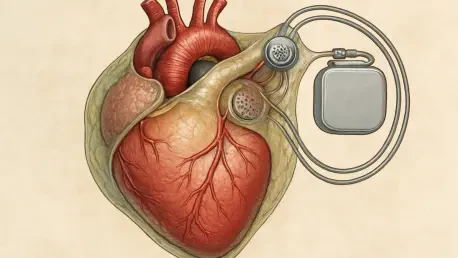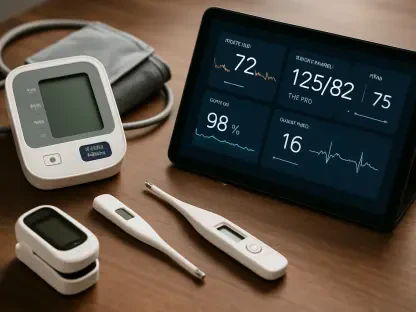I’m thrilled to sit down with James Maitland, a renowned expert in robotics and IoT applications in medicine, whose passion for integrating technology into healthcare has led to groundbreaking insights. Today, we’re diving into Boston Scientific’s recent $88 million acquisition of Elutia’s bioenvelope products, a move poised to make waves in the cardiac rhythm management sector. Our conversation explores the intricacies of this deal, the innovative features of the bioenvelopes, their potential to improve patient outcomes, and how this positions Boston Scientific in a competitive market. We’ll also touch on the financial implications and future commercialization strategies for these cutting-edge devices.
How did the partnership between Boston Scientific and Elutia lead to this $88 million acquisition, and what exactly are they gaining from it?
The partnership between Boston Scientific and Elutia was a natural stepping stone to this acquisition. They’ve been working together for a while, with Boston Scientific acting as a sales agent to support Elutia’s launch of their bioenvelope products. This $88 million deal now gives Boston Scientific full control over two key innovations: Elupro and Cangaroo. These are specialized devices designed to encase pacemakers and defibrillators, aiding in wound healing and reducing complications post-implantation. It’s a strategic move to strengthen their portfolio in the cardiac rhythm management space.
What makes Elupro and Cangaroo stand out in terms of their design and purpose for patients?
Both Elupro and Cangaroo are bioenvelopes made from an extracellular matrix, which is a biomaterial that supports tissue regeneration and healing. Their primary role is to minimize complications after a patient receives a pacemaker or defibrillator by reducing scar tissue and fibrosis, which can make future surgeries easier. What sets Elupro apart is its drug-eluting feature—it releases antibiotics like rifampin and minocycline into surrounding tissue to fight infection post-surgery. Cangaroo, being the first-generation version, doesn’t have this antibiotic component, but it still offers foundational wound-healing benefits.
Can you elaborate on how these bioenvelopes directly improve outcomes for patients undergoing cardiac device implantation?
Absolutely. For patients getting pacemakers or defibrillators, the risk of infection and poor wound healing is a significant concern. These bioenvelopes create a protective environment around the device, promoting natural tissue integration and reducing inflammation. With Elupro, the added antimicrobial protection from the antibiotics tackles infections head-on in those critical early days after surgery. This can mean fewer complications, shorter recovery times, and less need for additional interventions, which is a huge win for patient quality of life.
How does this acquisition position Boston Scientific in the competitive landscape, particularly against other players in the cardiac rhythm management sector?
This deal is a game-changer for Boston Scientific, especially in their competition with other major players in the U.S. cardiac rhythm management market, which is estimated to be a $600 million opportunity. By acquiring Elupro and Cangaroo, they’re directly challenging existing products like synthetic bioenvelopes from competitors. Analysts have noted that Elupro may have clinical and handling advantages due to its biomatrix design and drug-eluting capabilities, which could give Boston Scientific an edge in capturing a significant share of this market.
What can you tell us about the commercialization approach for these bioenvelopes now that the deal is moving forward?
Even before the acquisition, Boston Scientific was heavily involved in commercialization, providing access to around 900 sales representatives and clinical specialists to support Elutia’s efforts. With the deal set to close in the fourth quarter, they’ll take full control of marketing and sales. The transition should be smooth since their sales force is already familiar with the products, and analysts have suggested this will be a low-effort add-on for reps. It’s likely we’ll see an intensified push to integrate these bioenvelopes with Boston Scientific’s existing implantable devices to maximize reach.
From a financial perspective, how do you view the valuation and potential growth tied to this $88 million investment?
The $88 million price tag seems to align with historical valuations for fast-growing businesses in this space, according to industry analysts. While current bioenvelope revenue was reported at $3.5 million in the second quarter—with Elupro contributing about two-thirds of that—the growth potential is substantial. Given the size of the market and the clinical advantages of these products, there’s a strong case for significant revenue expansion in the coming years as adoption increases among healthcare providers.
What is your forecast for the future of bioenvelopes in the cardiac rhythm management sector?
I’m very optimistic about the trajectory of bioenvelopes in this field. As technology continues to advance, we’re likely to see even more refined designs with enhanced drug-delivery systems and biomaterials that further reduce complications. The demand for safer, more effective solutions in cardiac care is only growing, and with a market opportunity as large as $600 million in the U.S. alone, I expect bioenvelopes to become a standard component of device implantation procedures. Companies that innovate and integrate these solutions effectively, like Boston Scientific with Elupro, will likely lead the charge in transforming patient care over the next decade.









